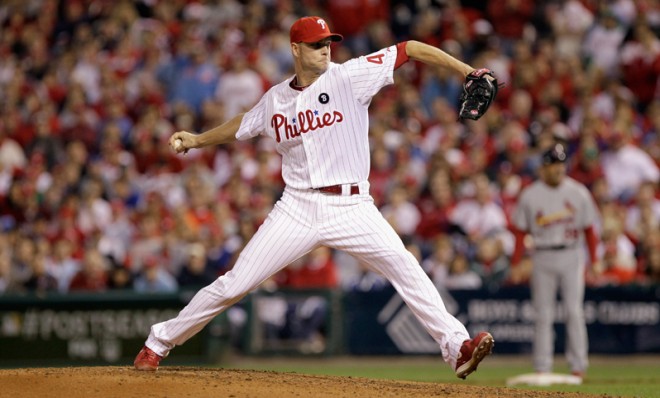Should injured baseball players be allowed to take HGH?
Though banned by the sport, one recuperating pitcher says HGH could help players heal


A free daily email with the biggest news stories of the day – and the best features from TheWeek.com
You are now subscribed
Your newsletter sign-up was successful
After a promising start to his career, Los Angeles Angels reliever Ryan Madson missed all of last season while recovering from Tommy John surgery.
Madson went under the knife last April, yet 14 months later, he's still not healthy enough to pitch. Frustrated by numerous setbacks, he suggested this week that human growth hormone could aid his recovery — and that Major League Baseball, which currently bans its use, should allow rehabbing players to take it in limited cases.
"If HGH were legal, just in the process of healing, under a doctor's recommendation, in the right dosage, while you're on the [disabled list], I don't think that's such a bad idea — as long as it doesn't have any lasting side effects, negative side effects," he told MLB.com.
The Week
Escape your echo chamber. Get the facts behind the news, plus analysis from multiple perspectives.

Sign up for The Week's Free Newsletters
From our morning news briefing to a weekly Good News Newsletter, get the best of The Week delivered directly to your inbox.
From our morning news briefing to a weekly Good News Newsletter, get the best of The Week delivered directly to your inbox.
More from Madson:
"But I will still believe, even if I get healthy without that," Madson added, "that it should be legal, in the right dosage, under supervision, with doctors, for the only purposes to help heal and get players back in the Major Leagues. Because people want to watch them, because of their talents, just to get them back on the field to play. That's it. I think it would be good for the game; I think it would be good for the fans. Fans want to see the best players play, and they want to see the players that they watch come back from injury and stay back. I think it would be a good thing." [MLB.com]
Madson's comments broached the delicate subject of performance enhancing drugs in baseball, a topic that has once again risen to the forefront of the game this year.
The Hall of Fame shut out everyone for the first time in years over mere suspicion that some players had taken PEDs. The league is reportedly considering unprecedented 100-game suspensions for star players linked to a PED-peddling Miami clinic. And though the league had already listed HGH as a banned substance, MLB and the players' union agreed over the winter to begin in-season testing for HGH for the first time.
MLB policy aside, the Food and Drug Administration has only approved HGH for limited uses, including hormonal imbalances and muscle-wasting diseases related to HIV. None of them have anything to do with expediting recovery times.
A free daily email with the biggest news stories of the day – and the best features from TheWeek.com
Yankees' pitcher Andy Pettite and others have admitted to using HGH, claiming it helped them recover from injuries faster than they otherwise would have. Yet there is no medical consensus on whether HGH actually has that effect.
"There are no studies — zero studies — showing any benefit from using growth hormone by itself to aid in recovery or post-surgical or post-injury type thing," the league's medical director, Gary Green, told MLB.com.
While the benefits of HGH are unproven, the side effects can be quite serious. Synthetic HGH can weaken heart muscles, cause muscle and joint pain, and lead to higher cholesterol levels. It has also been linked to an increased risk of diabetes and cancer.
Steroids, the more-maligned PED, have been around for much longer and are a far more accepted treatment for serious injuries. Madson said he was not suggesting players be allowed to take steroids, though the underlying point about their effectiveness gets at another problem, from MLB's perspective, regarding HGH use.
The league, acutely concerned about the stain PEDs have left on the sport, has drawn a firm line against all doping that could conceivably be said to give players an edge over the competition. HGH, by promoting muscle growth, would fall into that category. And allowing even limited HGH use would blur that hard line, raising questions about acceptable dosage limits, what sorts of injuries qualify for HGH treatment in the first place, and how league officials, who have struggled to enforce their existing policy, could regulate it.
Still, as Deadspin's Barry Petchesky pointed out, the league already does allow players to use one steroid: Cortisone. And as many others have noted, the league's strong stand against any and all "performance-enhancing" treatments would be untenable when extrapolated to other medical procedures.
"Imagine a world where baseball banned LASIK, arthroscopic surgery, antibiotics or other medical procedures that help players get better," Hardball Talk's Craig Calcaterra wrote. "Crazy, right?"
Jon Terbush is an associate editor at TheWeek.com covering politics, sports, and other things he finds interesting. He has previously written for Talking Points Memo, Raw Story, and Business Insider.
-
 6 exquisite homes with vast acreage
6 exquisite homes with vast acreageFeature Featuring an off-the-grid contemporary home in New Mexico and lakefront farmhouse in Massachusetts
-
 Film reviews: ‘Wuthering Heights,’ ‘Good Luck, Have Fun, Don’t Die,’ and ‘Sirat’
Film reviews: ‘Wuthering Heights,’ ‘Good Luck, Have Fun, Don’t Die,’ and ‘Sirat’Feature An inconvenient love torments a would-be couple, a gonzo time traveler seeks to save humanity from AI, and a father’s desperate search goes deeply sideways
-
 Political cartoons for February 16
Political cartoons for February 16Cartoons Monday’s political cartoons include President's Day, a valentine from the Epstein files, and more
